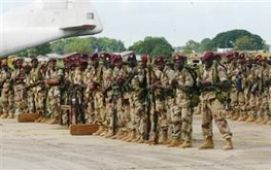Southern Sudanese descend on Juba ahead of Garang funeral
JUBA, Sudan, Aug 5, 2005 (AP) — A choir of hundreds rehearsed mournful songs at the cathedral in this southern town Friday and soldiers lined main roads to ensure security ahead of the state funeral the next day of southern leader John Garang.

|
|
Troops from Sudan’s elite presidential guard stand on the tarmac at Juba’s airport on arrival from the capital, Khartoum Friday, Aug. 5. 2005 ahead of the funeral of the country’s Vice president John Garang in the southern town. (AP). |
Garang’s body was taken by plane from town to town on Thursday and Friday, allowing people to pay last respects to the man who had fought for two decades to ensure their equality within Sudan.
His body was to be received Saturday morning in Juba by President Omar al-Bashir ahead of the funeral. Other dignitaries expected to attend the funeral included South African President Thabo Mbeki, Kenyan leader Mwai Kibaki and Garang’s longtime friend and backer, Uganda’s President Yoweri Museveni. The U.S. delegation will be led by Andrew S. Natsios, head of the United States Agency for International Development.
Hundreds of troops from both the national army and Garang’s Sudan People’s Liberation Army have filled Juba in the last two days. On Friday, cargo planes dropped off more than 300 elite presidential guards, distinct in their maroon berets. The soldiers carried military hardware and cooking pots as they piled into trucks headed to their camps.
Others stayed behind to guard roads leading to the airport. Government troops were also out in force, one soldier every 10 meters along key roads.
At the airport, hundreds of Juba’s Arab residents were being evacuated in the cargo planes. Men, women and children ran in single file across the tarmac to the planes, carrying suitcases and prayer rugs tucked under their arms. The town’s Arabs had been targeted in two days of rioting by southerners who blamed the government for Garang’s death.
Fighting in cities across the country killed at least 130 people, according to the Sudanese Red Crescent.
Garang’s death last Saturday in a helicopter crash in southern Sudan came just three weeks after he was sworn in as first vice president in a unity government established under a peace deal ending 22 years of war between the Arab Muslim-dominated government and rebels in the African Christian and animist south. He was also installed as the president of southern Sudan’s autonomous government.
Garang’s widow, Rebecca, told mourners at a stop in Rumbek that they should keep their faith and continue on the road to peace.
“Garang is dead but his vision for southern Sudan is alive,” she said, according to Sudan radio. She urged all Sudanese to stop the violence of the previous days and called on southern leaders to support the implementation of the peace agreement.
The Sudanese government and Garang’s rebel movement say the helicopter crash was an accident, but an investigation is planned. The U.N., Kenya and Uganda – who provided the helicopter – were participating in the probe.
Sudan People’s Liberation Army Gen. Aieng Deng said Friday searchers that had found the helicopter’s black box but have not studied it yet. It will remain at the site until investigators arrive on Monday.
“It is the results of the investigation which are going to speak for themselves,” said SPLM spokesman Yasir Arman. “Until the investigation results are out, we are not going to point any fingers in any direction.”
At Juba’s All Saints Cathedral, a choir of hundreds rehearsed a mournful song, in English, about the peace negotiations between Garang and Vice President Ali Osman Mohamed Taha.
“He cried to him, ‘Oh my people, oh my people, who will set you free?” they sang of Garang.
Mourners from surrounding villages were already gathering Friday, many of them filling the grounds of the cathedral, where Saturday’s proceedings will begin with a multidenominational service. Women cooked red beans, okra and sorghum porridge in large aluminum pots to feed the thousands expected at the funeral.
Carpenters and welders were working around the clock trying to finish Garang’s tomb of granite and mud brick, a one-story structure with a star-shaped chamber over the grave representing the “guiding star” in the SPLM flag. Garang’s son, Chol, watched over them for awhile in the morning.
“It is still a shock. It seems like a bad dream and that when I wake up I will see him. But all I find are people weeping,” he said.
“This was his life’s work for 22 years, so to actually be sworn in and then to die,” he said later, then paused with emotion. “He died a free man. He died in his own country.”
Garang’s death, and the clashes that followed it, raised fears about the stability of the peace deal struck in January. His charismatic – and sometimes strong-handed – leadership had been seen as essential to making the agreement work.
The accord provided for sharing of power and wealth with southerners. In six years, southerners are to have a chance to vote on secession. Garang had argued for greater autonomy for the south, not independence, though other southern leaders wanted more. Without Garang, northerners who reject independence for the south may find it difficult to persuade southerners to stay.
Since taking office, Garang had been working with al-Bashir and Taha on forming their Cabinet for a national unity government. It was to be completed by Aug. 9. Information Minister Abdel-Basit Sabdera said on Sudanese radio that it was possible there would be a short delay in the formation.
